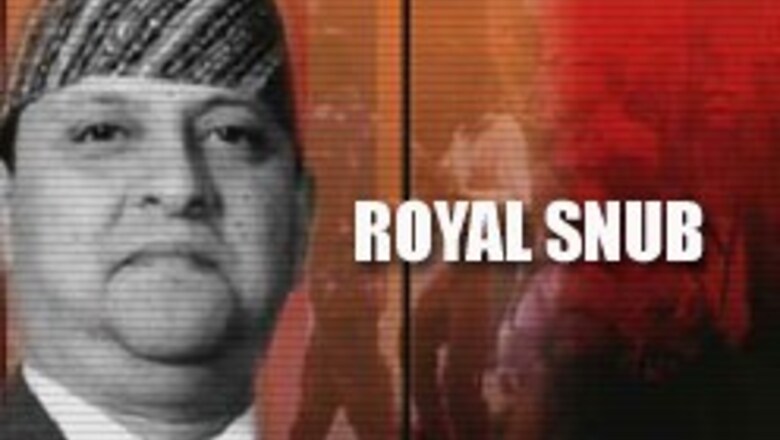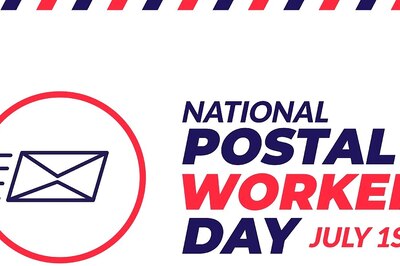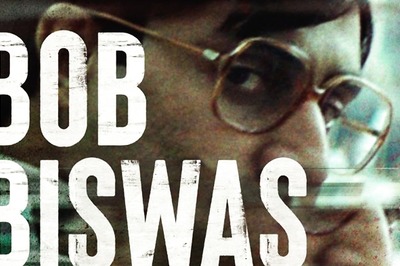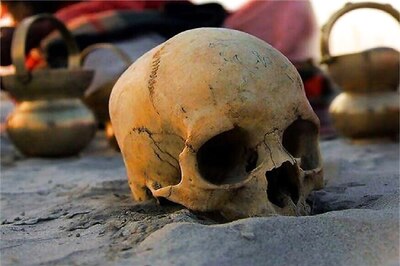
views
Kathmandu: The king's words were about democracy, but in this Himalayan land where a royal dynasty once revered as godlike is facing the whiff of open rebellion, the future appeared dangerously uncertain.
An opposition campaign of protests and a general strike against King Gyanendra's reign has tapped a deep vein of discontent in Nepal, the protesters' ferocity and violence blind-siding both the king and his opponents.
With Gyanendra's promise on Friday to restore multiparty democracy, his adversaries will find out in coming days just how serious protesters were when they chanted "hang the king!" and "burn the crown!"
For the king, the danger is obvious. His dynasty is already teetering; it long ago lost control of much of the countryside to communist insurgents and now appears unable to even command the cities. More protests could push it over the edge.
For the opposition, the challenges are less dramatic but no less daunting. Accepting the deal could lead Nepal's seething streets to turn on it; rejecting it could result in spiraling violence a situation that diplomats and analysts warn could give an opening to the Maoist rebels, the opposition's mistrusted allies.
The seven-party alliance behind the campaign is "afraid of the sentiment of the crowd and the ferocity that protesters are showing," said Yubaraj Ghimire, editor of the weekly Samay. "They do not know if they can control these outpourings."
That's a big problem for an opposition that is held in low regard by many of the protesters, who seem to operate on the enemy-of-my-enemy-is-my-friend principle.
One of the tens of thousands still in the streets after the king's speech, Saroj Shresthra, said he had little respect for the politicians, who "did nothing for the Nepali people."
In fact, when Gyanendra dismissed an interim government and seized power in February 2005, many Nepalis, frustrated by the corrupt and squabbling politicians now leading the protests, welcomed the king's pledge to restore political order and put down the insurgency, which has killed nearly 13,000 in over a decade.
PAGE_BREAK
Flash-forward 14 months; an intensifying insurgency and foundering economy have caused Gyanendra's popularity to plummet, and the opposition has successfully brought tens of thousands into the streets, many of them calling for the head of the king whose ancestors were revered as reincarnations of the Hindu god Vishnu.
"Gyanendra can fool the people again," said Prakash Thapa, a 30-year-old teacher. "We will always have to be looking at him. He could take power at any time again."
Others were less measured.
"This king is a very bad person. We will never accept him," said Saroj Sharma, a 28-year-old computer specialist. He repeated a now familiar call to hang the monarch, and warned: "We will hang all those who work with him."
Worrying words for an opposition sure to find itself under enormous pressure to take the deal from Nepal's major international partners - the United States and India, both of which played leading roles in persuading a defiant Gyanendra to back down.
The two nations praised Friday's speech, even though what was offered fell short of a key opposition demand; the return of parliament and the creation of a special assembly to write a new constitution that could limit, or even eliminate, the monarchy's role.
Gyanendra's offer also represents a chance for a clubby political elite, long accustomed to trading Cabinet posts, to get back into power, and Ghimire said at least a few opposition politicians would be tempted to take it, even if they publicly rebuffed the offer.
PAGE_BREAK
"If the protests calm, the deal could be accepted in a few days, or maybe one or two weeks," he said.
That's a big 'if' judging from the negative reactions on the streets of Kathmandu. Perhaps sensing as much, the royal government extended a curfew in the capital by four hours to midnight.
Along the ring road that skirts Kathmandu, the focus of the 16 days of protests; bonfires burned late into the night. Near the capital's center, tires burned and shops were looted.




















Comments
0 comment